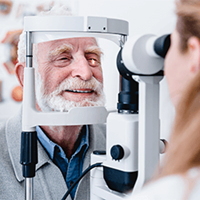What Is A Retinal Tear?
A retinal tear is a condition characterized by a small, linear break or rip in the retina, the delicate tissue lining the back of the eye. This can occur due to trauma, aging, or changes in the vitreous gel. Retina Associates of St. Louis advises prompt evaluation by an eye specialist upon experiencing symptoms like sudden floaters or flashes of light, as untreated retinal tears may lead to retinal detachment and potential vision loss. Early detection and treatment are crucial to prevent complications and preserve eye health. Contact our office in St. Louis, MO to learn more or to schedule an exam.
Reviews
What Are the Symptoms of Retinal Tears?
Common symptoms of a retinal tear include:
- Sudden appearance of floaters or spots in your vision
- Flashes of light, particularly in the peripheral vision
- A sudden decrease in vision or blurry vision in one eye
- A shadow or curtain effect blocking part of your vision
What Causes a Retinal Tear?
A retinal tear is usually the result of physical changes inside the eye that place direct stress on the retina. These changes often involve the vitreous gel, which can shrink or pull away from the retina, creating enough tension to cause a break. Tears may also develop after trauma or injury, or as a complication of other eye conditions. Understanding the direct causes can help patients recognize symptoms early and seek treatment quickly. Some of the most common causes of retinal tear include:
- Vitreous detachment creating traction on the retina
- Sudden trauma or blunt injury to the eye
- Severe eye strain or forceful physical activity in rare cases
- Complications following eye surgery or existing retinal disease
What Are the Risk Factors for Retinal Tears?
Certain conditions and eye characteristics can make you more likely to experience a retinal tear, especially as the eye changes with age. Recognizing these risks can help ensure timely monitoring and intervention to protect your vision. Some of the most common risk factors for retinal tear include:
- Advancing age and natural thinning of the retina
- Nearsightedness (myopia)
- History of eye trauma or injury
- Previous eye surgeries such as cataract removal
- Family history of retinal problems
How Is A Retinal Tear Treated?
A retinal tear is typically treated using either laser photocoagulation or cryopexy (freezing treatment). These procedures are aimed at creating adhesion or scarring around the tear, which helps to seal the retina back in place and prevent the accumulation of fluid underneath it, which could lead to retinal detachment. Laser photocoagulation involves using a focused beam of light to create tiny burns around the tear, while cryopexy uses extreme cold to achieve the same effect. These treatments are usually performed on an outpatient basis and are effective in preventing retinal detachment if caught early. Regular follow-up appointments are crucial to monitor the healing process and detect any new tears promptly.
Retinal Tears FAQ
What happens if a retinal tear is left untreated?
If a retinal tear is left untreated, the retina can detach from the back of the eye, leading to permanent vision loss. A retinal detachment is a medical emergency and requires immediate intervention to prevent further damage to vision.
Can retinal tears be prevented?
While retinal tears can't always be prevented, regular eye exams, especially if you are at higher risk, can help catch issues early. Early detection allows for timely intervention to prevent more serious complications, such as retinal detachment.
Can retinal tears be inherited?
Yes, retinal tears can have a genetic component. If you have a family history of retinal conditions such as retinal detachment or macular degeneration, you may be at higher risk for developing retinal tears. It's important to inform your eye doctor about your family history so they can monitor your eye health more closely.
Treat Retinal Tears
Retinal tears, though treatable with procedures like laser photocoagulation or cryopexy, require prompt attention to prevent more serious complications such as retinal detachment. At Retina Associates of St. Louis, our specialists emphasize the importance of early detection and intervention for anyone experiencing symptoms of a retinal tear. Regular follow-up visits ensure that treatments are effective and any new issues are promptly addressed, maintaining optimal eye health and vision for our patients. Contact our St. Louis, MO office to schedule a comprehensive exam.





